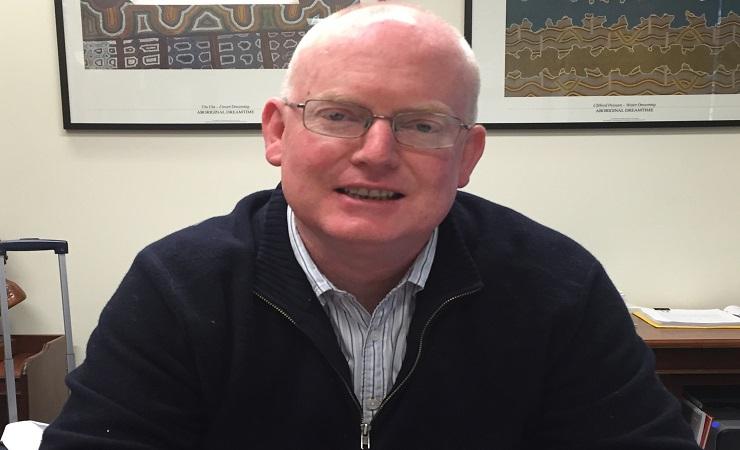ASIACALLING
Bali 9 lawyer offers his insights on capital punishment
"As Indonesia prepares to execute more prisoners by firing squad, Australian Barrister Julian McMahon shares his insights on working with prisoners facing death row in Indonesia and around the world."

Fifteen inmates are expected
to face the firing squad in Indonesia in the coming months, as the country signals
the next round of executions will go ahead.
Indonesia came under intense diplomatic fire and global criticism last year, when it executed 14 prisoners, including two Australian nationals, Andrew Chan and Myuran Sukumaran.
A year on, Nicole Curby caught up with their lawyer in Jakarta, Julian McMahon, who shared his insights on working with prisoners on death row.
![]()
Julian McMahon’s work throws him in the path of people’s lives at just the moment they are readying for their death.
He provides legal representation for prisoners on death row, and he does it for free.
An outspoken advocate of abolishing capital punishment, I assumed that Julian had always been driven to work on this issue.
But when I asked him, he told me that fighting the death penalty was something that he just happened to stumble into.
“It was just another case. I knew nothing about the death penalty. I wasn’t an expert on it. I wasn’t particularly interested in it,” McMahon tol me.
So how did this man come to work tirelessly and passionately on the issue, representing Australians facing the death penalty all over the world?
I started by asking Julian about what he saw working closely with convicted drug traffickers Andrew Chan and Myuran Sukumaran in the years leading up to their execution.
“Working with Andrew Chan and Myuran Sukumaran was a very interesting experience, because when I first acted for them 10 years ago they were not impressive young men. They were typical young men caught up in crime.”
But according to McMahon, there was a significant change during the decade of their incarceration.
They decided to turn their lives around, and spent time not only rehabilitating themselves but also other inmates.
“So what happened, and what I saw happen, and many people saw it happen, is that they turned a corner of the prison into an educational institution. They brought in teachers to help, teachers in all kinds of things, English, computers, painting, and so on. They gradually educated many prisoners inside the prison, they got them off drugs, they forced them to clean their lives up, and they helped them get a good education.”
Watching their journey, says McMahon, was a privilege. And a transformation that many people were affected by.
But despite the protracted and bitter legal battle, Chan and Sukamaran were executed by firing squad in April last year, alongside six others.
“To see them be executed at the end was profoundly upsetting,” McMahon remembers.
“We did feel that it was definitely the wrong thing to do, and we felt that it was unjust that people who had rehabilitated themselves, and were so useful to the Indonesian prison system, should nevertheless be taken out and shot.”
While the international community condemned Indonesia, the executions were largely supported at home.
And in a country that is virulently anti-drugs, Indonesia has continued to justify its use of executions to combat a so-called “drug emergency”.
Indonesia’s commitment to the death penalty puts the country in a global minority, in alongside countries like Iran, Pakistan, China and the United States.
Global trends also show that most countries are moving away from capital punishment.
“Right now around the world, around about 4 fifths of the world’s countries never execute. So it’s a very small minority of countries that think that’s a good way to proceed. So we have the strange position, that more and more countries stop executing, but right now, the countries that still execute some of them are increasing the number of executions they do. That’s the statistical reality,” McMahon says.
For 2008 to 2013, there was an unofficial moratorium on the death penalty in Indonesia.
But since the election of President Joko Widodo in 2014, the new administration has taken a hardline approach to drugs.
But executions, argues McMahon, aren’t the answer.
Take the case of Portugal, he says.
“Fifteen years ago Portugal had a terrible drug problem, a huge number of young people taking drugs and getting worse all the time. So they made a radical shift and they began to it treat it as a health problem. If young people got involved with drugs, instead of being treated like criminals, they were treated as patients who needed some treatment. And the result of that has been a huge improvement in many levels of dealing with health and crime in Portugal.”
According to Amnesty International, there were at least 165 people on death row in Indonesia at the end of 2015, almost half for drug-related crimes.
For now, their lives hang in the balance. It’s possible the next round of executions is just months away.
- Julian McMahon
- Nicole Curby
- Indonesia death penalty
- Executions Indonesia
- Drug policy Indonesia
Komentar (0)
KBR percaya pembaca situs ini adalah orang-orang yang cerdas dan terpelajar. Karena itu mari kita gunakan kata-kata yang santun di dalam kolom komentar ini. Kalimat yang sopan, menjauhi prasangka SARA (suku, agama, ras dan antargolongan), pasti akan lebih didengar. Yuk, kita praktikkan!